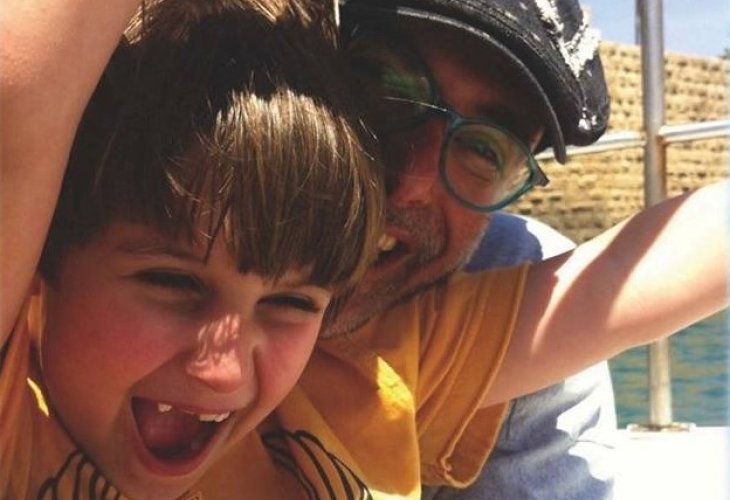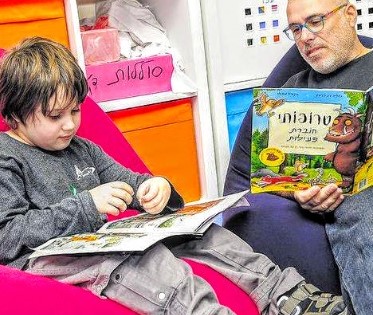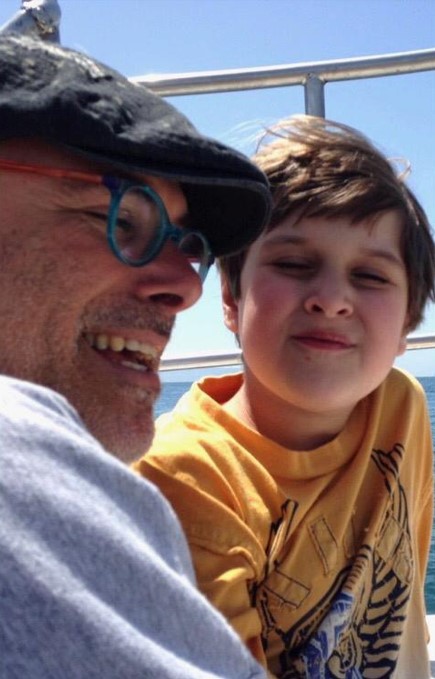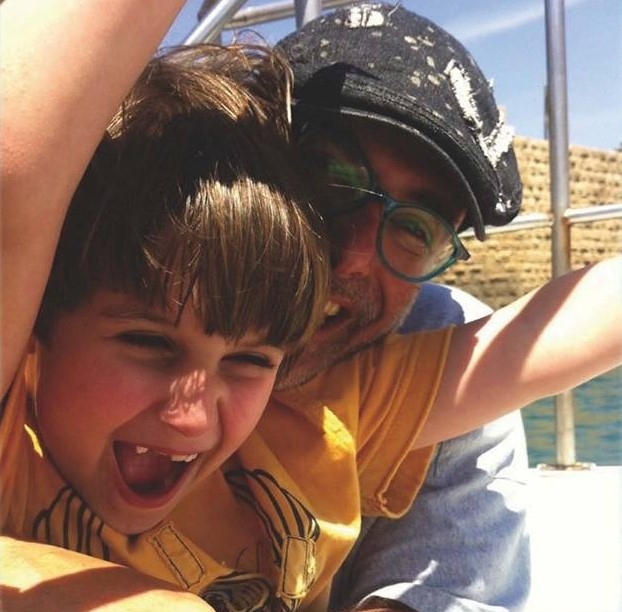When Uriel Called Out 'Dad, Dad!' for the First Time
Since his son was diagnosed with autism, Danny Or-Fox has dedicated his life to granting him independence and quality of life. Committed to helping his son and others like him integrate into society, Danny believes: 'Being different doesn't make them limited.'

Uriel Or-Fox was just a year and two months old when diagnosed on the autism spectrum. A month after the diagnosis, his father, Danny, became the chair of the children's division at ALUT, an association for children and adults with autism. Simultaneously, the Or-Fox family moved to Kibbutz Kishorit, a community combining typical families with those of special needs. Danny created a petting zoo there, and the family became part of the community.
Today, fourteen years later, as someone who supports both children and adults with special needs, Danny shares that parents' reactions to their child's diagnosis typically fall into two categories. "Some enter a deep crisis, feeling a sort of grief for the 'normal child' they won't have, but others choose from the start to see the positives, take joy in the privilege they have, and even leverage it into action. That was my approach."

"Then Uriel Ran to the Stage"
"As soon as I realized my child had autism, I made it my life's mission to teach Uriel values that would help him integrate into society and contribute to it, rather than be a burden," Danny clarifies. It wasn't always easy. "Several times, I found myself wrestling with my desire to bring Uriel closer to us, knowing that we believe he was born to fulfill his unique purpose. By trying to make him 'typical,' was I hindering his growth meant to occur with his limitations?
"I consulted with Rabbi David Abuchatzeira, who told me that if Hashem gave me this child, it was my duty to help and connect him as much as possible to this world. But the outcome may not be what I expect or plan for. His words strengthened me greatly, as I truly managed, with much effort, to teach Uriel independence. He can dress, bathe, and care for himself, and even stay home unsupervised. But there are also things he will never have, like children and family, which I understand aren't needed for his purpose here."
After living in Kibbutz Kishorit, the Or-Fox family moved to Kfar Vradim in the north. Danny wanted to do the best for children with special needs there too, setting up a highly professional communication classroom. But it was soon closed because some feared that "if such a good place existed, the village would fill with people with special needs."
"We decided to move the classroom to Ma'alot," Danny recounts. "To gather the funds needed for a state-of-the-art classroom, we organized a fundraising concert, raising half a million shekels and building one of the most advanced classrooms worldwide." He pauses, then eagerly shares a moment from that event. Clearly moved, he recalls: "We opened with my lecture, and the highlight was when singer David D'Or took the stage and sang a special song for Uriel.
"Before the concert," Danny notes, "David called me and asked if we could invite Uriel to join him on stage. I panicked at the thought and said, 'He has autism, he won't participate.' Ultimately, we decided to invite Uriel's siblings to sing the special song. We brought Uriel to the concert too, sitting him in the stands intentionally, so if anything happened, we could quietly take him out."

"Back then," Danny notes, "Uriel spoke both Hebrew and English well but never called me 'Dad' or his mother 'Mom.' We couldn't have conversations with him. But that concert surprised us all—Uriel sat for two and a half hours, not disturbing or moving. At the event's end, David D'Or went on for an encore, starting to sing 'Watch Over the World Child.' I joined my kids on stage to dance, and then something amazing happened—Uriel stood up and started yelling: 'Dad, Dad!' I couldn't believe it. I asked him, 'What do you want?' He replied, 'To the stage.' Of course, we rushed him to the stage, the audience cheering, standing up, and David sang again for him, while Uriel took the microphone and repeatedly said, 'Hello and thank you, everyone.'
"I left that concert feeling like a new person," Danny remembered. "In that moment, I understood the message Uriel wanted to convey—people with special needs know and understand far more than we might think. Uriel understood the situation, knew we organized the event for him, and thanked us in his way for the first time. From that moment, I knew I would devote my life to guiding children like Uriel, helping them express their vast potential, because they have so much to give the world."
Believe, Love, Respect
Danny continues his work fully voluntarily, now responsible for five assisted-living apartments in Rishon LeZion, housing people on the spectrum. "Each apartment hosts six residents," he explains, "guided by a professional staff and instructors. They live full community lives, and we also help them find jobs where they can earn a living."
But doesn't their limitation make it difficult for them?
"Why do you think they're limited? I believe we, the so-called 'typical' ones, might be the limited ones. We don’t understand what they inherently know. We judge people based on what's familiar to us. We assume the 'normal' person wakes up, brushes their teeth, goes to work, and returns at four. But who says that's normal? Just because it's what we're used to?
"The key is to treat those with special needs as normatively as anyone else. When we do, we'll see they're not a burden but a help in their unique ways. Sadly, not all workplaces want to include them, but I always tell people to give them a chance, and they'll find these workers excel—dedicated, rarely sick, detailed, and they never cut corners."

What challenges do they face at work?
"Autistic individuals are very sincere; they don't lie and say precisely what's on their minds. They can't scheme or cut corners like us. If they're unhappy, they tell their employers directly, sometimes even leaving the job. It's typically challenging for 'normal' people to handle such directness, affecting both sides. But with patience and understanding, it can be managed."
Danny shares that they regularly encounter deeply touching stories. "We run a project in Tel Hashomer, moving some individuals from closed psychiatric wards to our apartments. Some now live independently, without outbreaks or issues. Psychiatrists who witnessed this transformation were astounded. They've said they struggled for years to help these individuals without success, only to see this incredible change."
What’s your secret? How do you create such change?
"I believe Hashem desires just one thing from us—give love. When we provide these individuals with love, embrace them, and offer them security, they’ll want to give back all they can and thrive at their own life stations."
What about Uriel now? Is he part of the housing network?
"Uriel is still young, fifteen, living with us and bringing us many moments of joy and pride. Doctors once told us there was no chance he would ever speak or attend school, but now he speaks five languages—French, Chinese, Russian, Hebrew, and English. He writes and chats flawlessly on WhatsApp, learning it all alone via the computer. No one can explain it. He studies in a communication class at a regular school in Carmiel and continues to amaze us with his abilities. Despite this, he only eats snack puffs, porridge, and buns but is taller than me, at roughly 180 centimeters. Maybe those foods have growth ingredients!"
Do you ever worry about the future?
"I'll admit—I've lived with the feeling that having a child with special needs means I can't afford to die. Although Uriel knows English and math better than I do, he can't make his breakfast, and if I die, who will care for him? That’s why I focused heavily on nurturing his independence, and now I’m relatively at ease about it. He’s not living entirely independently but manages basic tasks well.
"In tough times, I remind myself that we didn’t come to this world by chance. Hashem has sent us all here for our purpose, and Uriel has come here for his special purpose. I believe having Mashiach come is near, and if anyone deserves to greet Mashiach, certainly it's these children, whose souls have never known sin."

